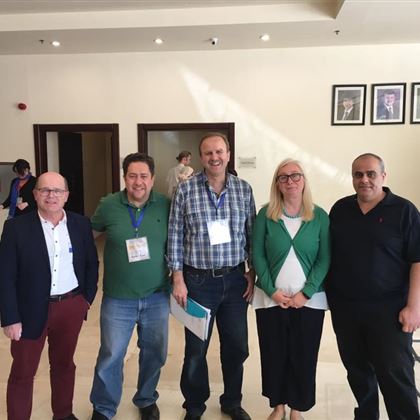The Role of Youth Work in Working With Refugees.
URI MENA was an associated Partner of the Conference, which took place in Amman from 24th to 26th of October 2017 about “dealing with refugees”. URI formed part of the team and volunteers together with Salto-youth EuroMed, Erasmus+ program, the Higher Council of Population in Jordan, the national agencies of Salto-youth program in Europe and several local NGOs in Jordan.
The conference was under the patronage of Her Royal Highness Princess Basma Bint Talal.
Among the key speakers were:
· Mrs. Maysoon -AL Zoubi-The Higher Population Council, she talked about “Impact of Syrian Refugees on the Demographic Opportunity in Jordan”.
· Mr. Andrea Fontana, EU Delegation in Jordan
· Mrs Irmeli Karhio, Finnish National Agency for Education for the network of the organisers Erasmus + Youth in Action Agencies
· Dr. Ali AlSheyab, Department of Refugees Affairs. He talked about “The Impact of Migrations on Jordanian Society”
· Mr. Omar Nuseir, the representative of the Ministry of Planning. He talked about “Jordan Response Plan 2017-2019 concerning refugees”
· Ms. Maysoon Khalaylelh, General Union Of Voluntary Societies, she talked about “The Role of Charities in Improving the Situation of Refugees in Jordan”
· Mr Ali Bibi, UNCHR Higher Council, he talked about “Jordan and the hosting of Syrian Refugees-challenges ahead”
The Conference analysed the current situation of refugees from the perspective of Jordanian experience. Also, it presented different model of inclusive projects that have been developed to face the increasing number of refugees. The Conference shed light on Syrian refugees’ situation in Jordan and how to benefit from Jordan experience in hosting such a large number of refugees with limited resources.
The Conference focused on opportunities within Erasmus Plus Programme framework such as:
1. Support the civil society work related to refugees’ empowerment (at different level as NGOs, municipalities, youth NGOs, institutions, etc.). This requires mapping of the needs of NGOs/youth work organisations/youth workers/institutions working with refugees.
2. Promote and share success stories and good practices about refugees’ empowerment and social inclusion of refugees at local, regional, and global levels.
3. Continue the networking among the participating organisations for future cooperation at local, regional and international levels.
The Conference clarified:
1. The terminology when speaking about refugees and making differences among: refugees, displaced people, asylum seekers and migrants;
2. The overall situation of refugees was tackled from different angles; political, social, civic rights.
3. The Conference tackled the elements of intercultural learning in such critical situation of needs and political crises due the current civic wars, economic crisis and high level of social tension.
4. The element of sharing experiences about the situation of refugees was crucial for the mutual understanding and for analysing the modelling of good practices and verify their transferability.
On the second day, the participants were divided in five groups to get a practical insight into the precious and professional work the local NGOs are doing in Jordan.
The field visits focus on:
1. Women Empowerment.
2. Social Cohesion between refugees (particulrly Syrian refugees) and host communities.
3. Health and Well-Being of refugees.
4. Refugees’ Labour Market (Competences)
5. Public Perception of Refugees and Change of Perceptions.
Afterwards, the participants had the opportunities to digest in workshops what they have learnt, hear more best practices examples, develop new strategies and establish partnerships to improve the quality of work with refugees. Participants and guests came from European Union, UK and Jordan.
